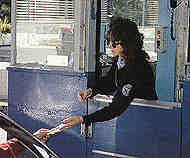7/17/2012
Congressional Budget Office Examines Toll Road BankAccountants for the legislative branch examine proposal to create federal infrastructure bank.

The Congressional Budget Office (CBO) on Thursday released a report on the strengths and weaknesses of the proposal to create a national infrastructure bank. The bank idea has grown increasingly popular among transportation officials and politicians because it allows them to raise more money from motorists to fund transportation projects.
CBO calculated that annual spending on highways, transit and passenger rail has averaged $50 billion at the federal level and $150 billion at the state and local level. Private railroads also spend $12 billion on their infrastructure. Using the Federal Highway Administration's (FHWA) wish list of existing projects, another $83 billion more could be spent per year.
To create more funding for such projects, the infrastructure bank would allow federal government officials decide which local projects should receive a taxpayer-subsidized loan or loan guarantee. The loans would be repaid from a dedicated revenue stream, which is why the infrastructure bank is only likely to be used to provide profit for the companies that construct and operate toll roads.
"The bank could provide the subsidy amounts needed to compensate private-sector investors for benefits that accrue to the general public and the economy at large," the CBO report explained. "A key limitation of providing funding through a federal infrastructure bank is that only some surface transportation projects would be good candidates for such funding, because most projects do not involve tolls or other mechanisms to collect funds directly from project users or other beneficiaries."
CBO notes this arrangement does not "differ substantially" from the existing structure whereby the US Department of Transportation already offers loans and loan guarantees for toll roads through the Transportation Infrastructure Finance and Innovation Act (TIFIA) which has doled out $8 billion in subsidies since 1998. The main difference is the bank, in effect, dilutes the decision-making authority of the states and transfers it to Washington.
"Under current law, state and local governments have significant flexibility to choose most federally funded projects under broad federal guidelines," CBO stated. "In addition, a federal infrastructure bank could centralize -- and, in some people's view, depoliticize -- decisionmaking about which projects receive federal funds by creating a competitive application and award process for those funds."
The number of projects that would qualify for such funding would be limited. Most projects with a truly dedicated revenue stream would not need a government loan. Most infrastructure bank proposals envision support only going to toll roads with a minimum cost of $100 million, further narrowing the eligible projects. Currently, about 4 percent of projects funded by FHWA were large enough to require an environmental impact statement, and even fewer would qualify for infrastructure bank subsidy. CBO questioned the attractiveness of that subsidy compared to traditional means of financing.
"The federal government already subsidizes borrowing by state and local governments by excluding interest received on municipal bonds from federal income taxes," the report stated. "As a result, for many years, the most creditworthy municipal governments could typically borrow more cheaply than the Treasury... To the extent that projects funded by an infrastructure bank would otherwise have proceeded using more traditional financing, the result of creating such a bank might be a shift in investment sources rather than an increase in total investment."
A copy of the report is available in a 210k PDF file at the source link below.


